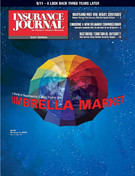Delaware voters face a choice in this year’s election for state insurance commissioner between a Democratic counsel to the current governor who vows to “stand up for Delawareans” and a Republican veteran legislator who lays claim to being a “great conciliator” able to bring people together to solve problems.
Democrat Matt Denn faces opposition in the Sept. 11 primary from Karen Weldin Stewart but as his party’s endorsed candidate, Denn is favored to win and go on to the November final against Rep. David Ennis, who is unopposed in the Republican primary for the insurance post.
(Candidate Karen Weldin Stewart did not respond to several inquiries to be interviewed by Insurance Journal for this story.)
Denn and Ennis are vying statewide for the opportunity to lead the Delaware Insurance Department with its budget of close to $20 million and about 75 employees. The department generates more than $50 million for state coffers. The incumbent, Republican Donna Lee Williams, declined to run for re-election after serving in the post for the past 12 years.
Regulatory Approach
Neither Denn nor Ennis espouses a broad philosophy to describe his approach to regulation. Denn promises a case-by-case approach to determining if and when a regulator should intervene in a marketplace, while Ennis would first “jawbone” to work through problems before taking regulatory action.
According to Denn, a Yale Law School graduate who has a background as an advocate for children’s and legal aid services and a crafter of legislation for Gov. Ruth Anne Minner, “the overarching responsibility of the Delaware Insurance Comm-issioner is to ensure that Delaware insurance consumers have access to affordable and fairly administered insurance.” Denn said that he would be “more visible and available and become more of an advocate for individual policy holders.”
Ennis said he would draw on his 15 years of business background with blood banks and project management, along with his 20 years of leadership experience on the state’s Banking and Insurance Committee and within the National Conference of State Legislators — roles that have involved negotiating on product liability, medical malpractice, insolvency, state budget, department contracting issues and other insurance matters.
“I am a person who gets along with others and likes to find solutions,” Ennis told Insurance Journal. He is proud to have received a joint award from the trial bar, medical and hospital industries calling him the “great conciliator” for his work on malpractice insurance issues.
“I’m a bit free market in my approach,” explained Ennis. “But when things get out of hand, a regulator has to step in. In a practical way, I believe in protecting people’s rights. I would not hesitate to jawbone first, try to talk and work through problems first.”
Denn said his priorities would be the cost and availability of health care; the cost and availability of auto and homeowners insurance; and advocacy for individual policy holders.
Ennis also places health insurance near the top of his priority list. He said he would work to attract new products and promote healthier lifestyles.
Another top issue for Ennis is operating an agency that is “user friendly” for consumers, employees, insurance agents and companies. “They are the clients deserving of quality service from the Department of Insurance,” he said.
Ennis said he would also press for the department to be more timely and efficient and, specifically, improve the speed-to-market of new insurance products.
Room for Improvement
Neither candidate is highly critical of the current commissioner, Williams, or her tenure but each sees room for improvement.
Ennis is impressed with the current workplace safety program under which employers can qualify for workers compensation premium discounts. “I would like to build on that program,” Ennis said.
Ennis is also impressed with the DOI’s elder information program. Three staff members have in turn trained more than 50 volunteers in the intricacies of Medicare. They visit senior centers to counsel and assist senior citizens in with Medicare issues and claims. “Perhaps we can commit more energy to that,” Ennis said.
He also thinks that the elder information program may serve as a model for a similar special needs information unit to assist insureds with chronic illnesses such as juvenile diabetes.
The Repblican said he has also heard “good things” about the DOI’s agent licensing unit.
Ennis is uncomfortable over the way the department awards and funds contracts for company examinations. Noting that this had been a problem in the past, he says he will review the procedures and the fees to make sure they are competitive and fair.
Denn agrees Williams has done a good job in the agency licensing area and also praised her performance in policing insurer solvency.
However, Denn is championing improvements, particularly in the areas of fraud prevention, in being more visible as commissioner, and being more of an advocate for individual policyholders.
Noting that many Delaware citizens’ health insurance falls under the federal ERISA authority and not under the state’s control, Denn nevertheless thinks the state has a role to play to help these insureds. He would like to beef-up the department’s legal assistance to individuals with federal ERISA claims.
The wide reach of ERISA also concerns Republican Ennis, who cited this law’s expansion as a reason he opposes federal regulation of insurance.
“ERISA was supposed to be for retirees,” he noted, adding that some reports show it now covers 80 percent of Delaware’s insureds.
He warns that there are too often “unforeseen consequences” once the federal government gets involved. “I believe federal regulation of insurance could stifle state innovation,” he stated. “Further intrusion into the property/casualty business by the federal government is not good for America.”
His concern over federal intrusion into regulation is one reason Ennis vows to be an active participant in the National Association of Insurance Commissioners (NAIC).
Denn, while also skeptical of a larger federal role in insurance, sounds more open to compromise. “Selected limited federal intervention could be helpful, especially to a small state like Delaware and especially in the area of consumer protection since so often insurance companies threaten to leave small states if new regulations they do not like are enacted,” the Democrat said.
Denn thinks that current efforts by the NAIC to achieve more uniformity among states in their regulations “probably are sufficient.” He said he “would have to be convinced” of the need for further uniformity beyond that being touted by the NAIC.
Insurance Journal also asked about other issues:
Auto Insurance
Denn, citing statistics that the state’s average auto rate is the sixth highest in the country, thinks auto rates need to be scrutinized more closely. “Delaware’s rates should be reasonable: we have only an average number of auto accidents in our state, and our juries are very conservative when it comes to awarding damages to auto accident victims,” he maintained. He vowed to crack down on uninsured drivers.
Ennis cited the need to get at the “permanent population” that contributes to losses and rising premiums for uninsured coverage.
Credit Scoring
Denn opposes insurers’ use of credit scoring which is now permitted in the state within certain parameters. While he feels he could probably change the rules by regulation, Denn would prefer to have the legislature enact a ban on credit scoring. The state Senate defeated a measure for such a ban last session.
Ennis, citing personal experience of a friend who suffered credit scoring problems following a divorce, does not oppose credit scoring but believes there have to be consumer protections. “We have to find a way to give consumers an easy way to challenge a credit score,” he said.
Homeowners
Denn had previously criticized the current commissioner for the lack of standards governing how insurance companies could use loss history in non-renewing policies. Now, he takes some credit for the new rules setting forth when the use of loss history can or cannot be used. He vowed to enforce them vigorously.
As with credit scoring, Ennis is not opposed to the use of property loss history but has concerns. He notes that in some places a claim on a property is not a result of mismanagement and believes that “victims” of others who have to file claims should not be penalized.
Ennis used the loss history issue to express his wish that the industry would do more to recognize clams-free insureds and not simply penalize those who file claims.
Elected vs. Appointed Commissioner
Years ago, Ennis supported an appointed position, one that would go even beyond the governor’s own term. But he now thinks that only makes sense in conjunction with a more sweeping reorganization of the state’s financial services regulatory apparatus involving banking and securities as well as insurance. Either elected or appointed is fine with him.
Denn is fine with either as well. “There are pros and cons to electing insurance commissioner. The upside is that voters get direct input and in a small state like Delaware this can be very helpful,” noted Denn. “The down side is there are people and entities who can gain access through the campaigns who maybe should not have direct access.”
Campaign Funding
Regarding campaign funding, Denn is critical of commissioners who accept contributions from insurance interests. “An Insurance Commissioner who allows his or her campaign to be subsidized by the insurance industry cannot be a fair regulator, and cannot be an advocate for Delaware policyholders with the insurance industry… I will not accept campaign contributions from insurance company executives,” Denn states on his web site.
As for Ennis, he believes the law blocks contributions from any party “indemnifying” an insurance product, but that individual company employees and agents may contribute.
“I would welcome their contributions and it would not ’tilt’ my positions in any way,” Ennis insisted.
Topics Legislation Auto Delaware
Was this article valuable?
Here are more articles you may enjoy.


 Former Ole Miss Standout Player Convicted in $194M Medicare, CHAMPVA Fraud
Former Ole Miss Standout Player Convicted in $194M Medicare, CHAMPVA Fraud  Allstate CEO Wilson Takes on Affordability Issue During Earnings Call
Allstate CEO Wilson Takes on Affordability Issue During Earnings Call  Zurich Insurance’s Beazley Bid Sets the Stage for More Insurance Deals
Zurich Insurance’s Beazley Bid Sets the Stage for More Insurance Deals  Howden-Driven Talent War Has Cost Brown & Brown $23M in Revenue, CEO Says
Howden-Driven Talent War Has Cost Brown & Brown $23M in Revenue, CEO Says 


